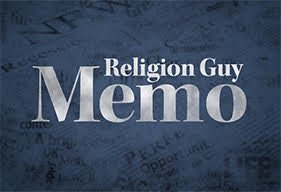Whew! Within a matter of days Elon Musk bids $44 billion to get full control of Twitter, Netflix's market value plummets $54 billion, Florida's conservative version of "cancel culture" penalizes the Disney empire, and CNN kills off its streaming service in a month after investing $300 million -- perhaps the worst industry flop since Time Warner's 2001 merger with AOL.
Anchor Kasie Hunt, who left MSNBC for CNN+, embraced a life-goes-on attitude: "The news is the news is the news is the news." (She was quickly named CNN's Chief National Affairs Analyst.)
By the way, a certain influential newspaper in New York City also named a new team of top editors. Did you see those photos of incoming editor Joseph Kahn?
Maybe all that media turbulence is far less important than the inexorable accumulation of 21st Century cultural power by Twitter and other "social media: giants.
Thus, readers will want to consider this warning from Jonathan Haidt, a social psychologist at New York University's business school, in the May issue of The Atlantic: “Why the Past 10 Years of American Life Have Been Uniquely Stupid.”
American democracy is now operating outside the bounds of sustainability. If we do not make major changes soon, then our institutions, our political system, and our society may collapse during the next major war, pandemic, financial meltdown, or constitutional crisis.
Religion writers: Despite Haidt's imagery of failed communication taken from the biblical Tower of Babel (Genesis 11:1-9), his article sidesteps whether faith groups could help restore societal calm and how they're being reshaped by ubiquitous media. Perhaps he'll get into that in his book "Life After Babel Adapting to a World We Can No Longer Share," due from Penguin next year.
Though critics often say conflicting religions erode social cohesion, is it only coincidence that organized religion's slump to near-Depression status since A.D. 2000 occurred simultaneously with the disintegration Haidt decries?
Speaking of which, writers might review how polarized America and religion have been treated by two thoughtful evangelicals: "Them: Why We Hate Each Other — and How to Heal" (2018) by U.S. Senator Ben Sasse of Nebraska, and "Divided We Fall: America's Secession Threat and How to Restore Our Nation" by attorney David French of TheDispatch.com. ( and click here for a tmatt interview with French about that book.
Since President Barack Obama drew from The Atlantic article in his attack on High Tech at Stanford University last week, it's important that Haidt targets not only Donald Trumpy populism but liberals' “great awOkening" and politically correct enforcement that has frozen academic and media discussion. He affirms that "the left controls the commanding heights of the culture: universities, news organizations, Hollywood, art museums, advertising, much of Silicon Valley," unionized schoolteachers and the colleges that train them.
So what happened to us? Why are "red" and "blue" Americans drawing apart? Why is public rhetoric so coarse or silly? Why do so many swallow disinformation?
Journalists will want to assess Haidt's case in all its complexity and run it past others, but here' are a few key claims.
The first phase of social media appeared to foster communication and be harmless till around 2010. Then they started big-time erosion of three things that bind democracies together, "extensive social networks with high levels of trust," "strong institutions" and "shared stories" about who Americans are as a people despite their vast diversity. New "like" and "share" and "retweet" functions rapidly spread "dishonesty" and roused "mob dynamics." The more outrageous material gained clicks and eyeballs, overshadowing voices from the middle 85% of the population. Anonymity encouraged extremism and helped foreign adversaries turn Americans against each other. Etc. Etc.
(Yes, The Guy acknowledges some loss of trust results when news media professionals are doing their job.)
While Haidt contends that these maladies exploded very recently, what if some factors have a longer time frame?
So says Commentary magazine editor John Podhoretz in reflecting on Will Smith's infamous slap of Chris Rock at the Oscars. He notes that a 1993 Wall Street Journal editorial lamented "the disastrous long-term effects of the loosening of cultural and social restraints in America in the late 1960s."
Podhoretz thinks in this era "we have been encouraged to be slaves to our impulses rather than masters of them, and we are coming undone because of it."
FIRST IMAGE: Public domain art with Aleteia feature entitled “Discovery of biblical mortar hints at location of Tower of Babel.”


